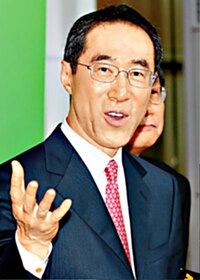Chen Chanin: Difference between revisions
No edit summary |
m (1 revision imported) |
Latest revision as of 03:54, 27 March 2019
Chanin Chen Чен Чанин 秦嘉忍 | |
|---|---|
 Chen in 1988 | |
| 7th President-General of Namor | |
| In office 7 November 1982 – 20 April 1990 | |
| Deputy | Antelope Txo |
| Preceded by | Su Shui |
| Succeeded by | Alicia Wolf |
| Vice President-General of Namor | |
| In office 20 April 1980 – 7 November 1982 | |
| Preceded by | Tzang Ye |
| Succeeded by | Antelope Txo |
| Secretary-General of the Liberationist Party of Namor | |
| In office 7 November 1982 – 17 March 1990 | |
| Preceded by | Su Shui |
| Succeeded by | Antelope Txo |
| Premier of Shanpei District | |
| In office 1975–1980 | |
| Personal details | |
| Born | February 18, 1933 (age 91) Shayen, Shanpei, People's Republic of Namor |
| Nationality | Namorese |
| Political party | |
| Alma mater | University of Shanpei |
| Profession | Politician |
Chen Chanin (born February 18, 1933) is a Namorese politician who served as Vice President-General of Namor from 1980 to 1982 and President-General from 1982 to 1990. He is the first President-General to enter office unelected, having succeeded the impeached President-General Su Shui.
Chen was born in 1933 in Shayen, Shanpei - the first President-General to be born after the Namorese Civil War. He studied international relations at the University of Shanpei and became a diplomat. In 1971, he represented Namor in negotiating an end to the Third Namo-Luziycan War, and played an important role in easing restrictions on Namorese Lutheran Catholics in the aftermath of the war. In 1975, he was elected Premier of Shanpei.
In 1980, Chen was chosen as Su Shui's running mate and elected Vice President-General, succeeding outgoing Vice President-General Dung Lan. However, he did not stay in the position for long before Su was impeached in 1982 for sharing confidential information with persons outside the government. After his abrupt ascent to power, Chen granted a full pardon to Su - a controversial move that was lauded by supporters as a step towards reconciliation and condemned by critics as an obstruction of justice.
Although it was initially believed that Chen would not run for President-General in 1985 due to his peculiar situation, Chen was nominated as the Liberationist candidate. During his campaign, he tried to distance himself from Su and promised a "cooperative" attitude with opposition parties in determining important policies and drafting legislation. He ended up losing to Democratic Socialist candidate Vang Ze in the first round, in which no candidate won the required percentage of votes; in the second round, he defeated Vang by a margin of 0.3%, in what remains the closest election in Namorese history. The surprise victory for Chen elicited accusations of electoral fraud and demands for another round, although an investigation by the Supreme People's Procuratorate concluded that the results were legitimate.
As President-General, Chen adopted a less hardline stance than Su. An advocate of people-centered development, he emphasized social and environmental development over economic growth. In an attempt to reduce unemployment and reinvigorate Namor's slowing economy, he launched projects aimed at improving the standard of living in the north and west, reminiscent to the development programs of the 1920s and 1950s. Chen tried to improve Namor's image abroad; he announced a no first use policy in 1987 and reached an agreement with the Lutheran Catholic Church in 1988 that allowed the Patriarch of Gusev to return to Namor while granting the Namorese government some say in determining the Patriarch. In 1989, he became the first President-General to call for an eventual end to conscription, though he was unable to repeal conscription during his presidency.
Chen ran for reelection in 1990, but was defeated by Democratic Socialist candidate Alicia Wolf. The election marked an end to 65 years of Liberationist rule. Following his defeat, Chen resigned from the Liberationist leadership.